Our diagnostic radiologists
From oncology, neurology, cardiology to orthopaedics, you will find doctors skilled in PET scans across the different specialties at Mount Elizabeth.
Our experienced team of healthcare professionals will prioritise your privacy and comfort at every stage of your treatment.






